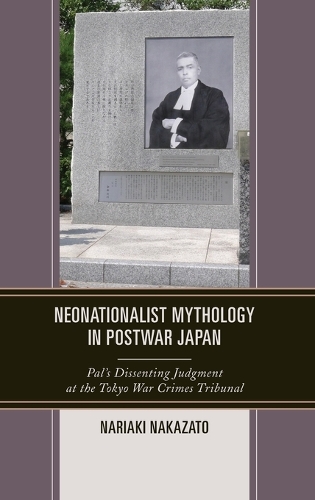
Neonationalist Mythology in Postwar Japan: Pal's Dissenting Judgment at the Tokyo War Crimes Tribunal
(Hardback)
Publishing Details
Neonationalist Mythology in Postwar Japan: Pal's Dissenting Judgment at the Tokyo War Crimes Tribunal
By (Author) Nariaki Nakazato
Bloomsbury Publishing PLC
Lexington Books
27th April 2016
United States
Classifications
Professional and Scholarly
Non Fiction
War crimes
Nationalism and nationalist ideologies and movements
Asian history
952.04
Physical Properties
Hardback
302
Width 158mm, Height 239mm, Spine 27mm
590g
Description
Radhabinod Pal was an Indian jurist who achieved international fame as the judge representing India at the Tokyo War Crimes Tribunal and dissented from the majority opinion, holding that all Japanese Class A war criminals were not guilty of any of the charges brought against them. In postwar Japanese politics, right-wing polemicists have repeatedly utilized his dissenting judgment in their political propaganda aimed at refuting the Tokyo trials majority judgment and justifying Japans aggression, gradually elevating this controversial lawyer from India to a national symbol of historical revisionism. Many questions have been raised about how to appropriately assess Pals dissenting judgment and Pal himself. Were the arguments in Pals judgment sound Why did he submit such a bold dissenting opinion What was the political context More fundamentally, why and how did the Allies ever nominate such a lawyer as a judge for a tribunal of such great political importance How should his dissent be situated within the context of modern Asian history and the development of international criminal justice What social and political circumstances in Japan thrust him into such a prominent position Many of these questions remain unanswered, while some have been misinterpreted. This book proposes answers to many of them and presents a critique of the persistent revisionist denial of war responsibility in the Japanese postwar right-wing movement.
Reviews
[T]his book is a fine achievement, and does indeed succeed in laying to rest some of the myths that have persisted around the story of Judge Pal. * The International Journal of Asian Studies *
Nariaki Nakazatos timely and important book appears sixty years after the commencement of the Tokyo war crimes trials, proceedings that helped shape postwar Japan and that were decisive in the development of international humanitarian law. The dissenting judgment by the Indian judge, Radhabinod Pal, which labeled the majority view victors justice, has been hailed by Japans postwar right as proof of the illegitimacy of the trial, and even as vindication of Japans wartime actions. Against this, a leading Japanese historian of India offers a detailed analysis of Pals legal judgment, a finely grained account of his life and times as a figure shaped by his Indian milieu, and a critical evaluation of the appropriations of Pal by Japans revisionists. This meticulously researched and fascinating account could only be crafted by someone equally at home with modern Indian history and current political controversies in Japan over its past. It is essential reading for scholars and students of the Tokyo trials, of international humanitarian law, and of the uses and abuses of history. -- Sanjay Seth, Goldsmiths, University of London
Neonationalist Mythology in Postwar Japan is a passionate, nuanced, and meticulously detailed analysis of the factors in Japanese and Indian history, as well as those in the history of the United States reorganization of its Asian interests and alliances in the Cold War and post-Cold War eras, that have enabled an obscure legal documentJustice Radhabinod Pals dissenting judgment at the Tokyo War Crimes Tribunal (194648)to play a pivotal part in the rise of neonationalism and the politics of war-crimes denial in contemporary Japan. -- Gyanendra Pandey, Emory University
Neonationalist Mythology in Postwar Japan offers a much-awaited critical biography of Radhabinod Pal, a Bengali jurist who produced a controversial dissenting opinion at the International Military Tribunal for the Far East. Based on meticulous archival research and interviews involving Bengali, English, and Japanese languages, Nariaki Nakazato sheds new light on Pals life and the troubling legacy of his dissentient judgment in the making of the rightist nationalist discourse in postwar Japan. -- Yuma Totani, University of Hawaii
Author Bio
Nariaki Nakazato is professor emeritus at the University of Tokyo.
